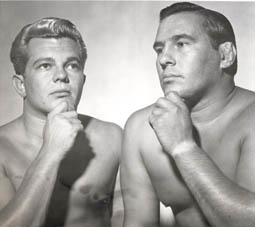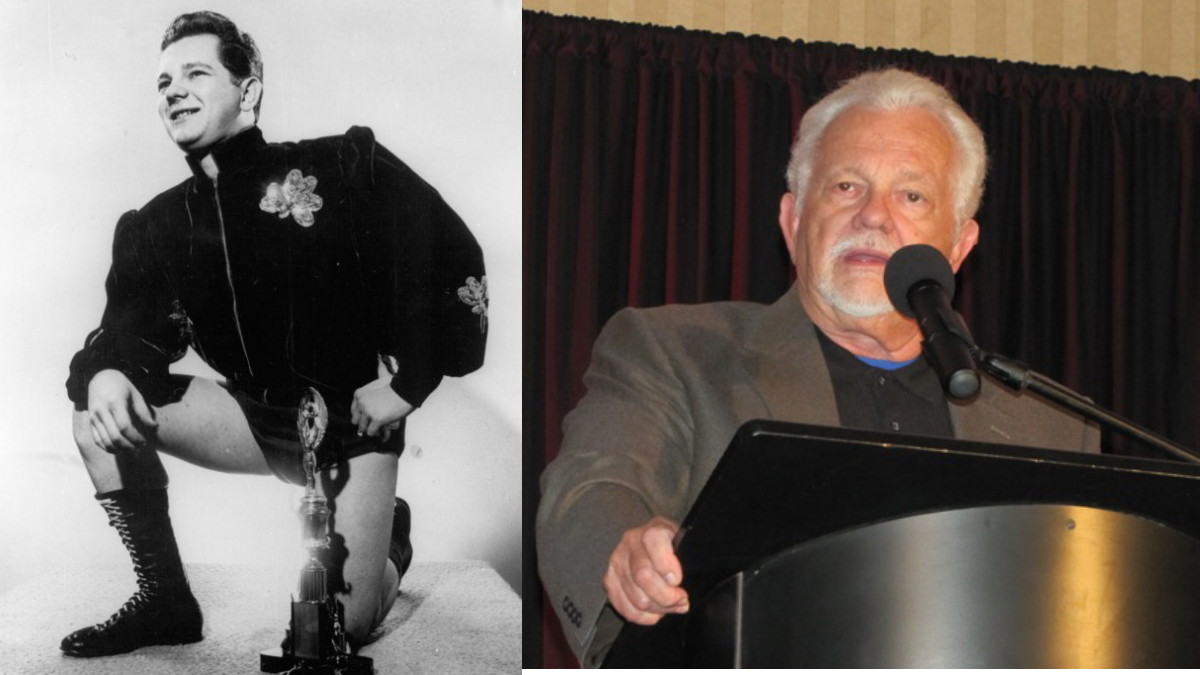Les Thatcher has travelled many roads in his career, he’s been from Florida, to the Carolinas all the way to the eastern tips of Canada. And on April 13 in Las Vegas, he will be rewarded for his lifetime of service to the business.
Thatcher, born Leslie Maladay, has been selected the recipient of this year’s Art Abrams Lifetime Achievement award by the Cauliflower Alley Club, an award that has humbled the veteran of many ring wars.

Les Thatcher and Rudy Kay in 1968 – courtesy www.lesthatcher.com
“I was tremendously excited and tremendously humbled all at the same time,” Thatcher told SLAM! Wrestling. “I mean, I cannot tell you, I feel I’ve busted my hump in all aspects of the wrestling business to do my very best and I love what I do. I never set-out to win any mythical titles.”
And although he’s seen awards before, this one holds a special place for Thatcher.
“I’ve won some awards I would have to say that this is the icing on the cake for me,” he said.
Thatcher’s old promoter and friend Rudy Kay was pleased to hear of his success. “Maybe the guy didn’t make it to the top echelon in wrestling but he was always really devoted to the sport from the time I knew him,” Kay said. “So it couldn’t go to a nicer guy.”
It was Kay that brought the Ohio-born Thatcher into the Maritimes in the 1970s.
“I came in wrestling and came in as a heel with the idea that I was going to turn babyface at some point,” Thatcher said. “Of course, back then if you were American and if the Canadians even thought you were close to draft age, then you were a bad guy, you were a draft dodger,” he said with a laugh. “I wasn’t even eligible for the draft but I was a draft dodger anyways because I was American.”
Oddly, this was the only time in Thatcher’s career that he worked as a heel, because the 5’10”, 220-pound Thatcher never thought he fit the heel requirements.
“It wasn’t like I was dead-set against being a heel or anything like that it just never came up,” he noted. “And not that I was pretty — then, now or anytime — but I just looked more like a babyface and that was my strong suit. Nobody ever tried to change me.
“Again, Rudy, up there knowing the lay of the land, that I wasn’t going to be accepted initially and we’d work it into where I would,” he said. “I had the first, last and only opportunity to ever work heel.”
During his stay in the Maritimes, Thatcher was moved from the ring to the announcers booth after the unexpected departure of regular match caller George “Crybaby” Cannon.
“I asked him and he jumped right in,” Kay said. “And to my big surprise he was just as good as any commentator I had ever seen.”
Thatcher still vividly recalls the change in his career.
“The funny thing is I remember it as if it were yesterday, because it was the start of another branch of my career as it were, it was kind of the fork in the road and I picked up another occupation,” he said. “On Monday when we normally worked Moncton, Rudy called me and just started a conversation.
“He said ‘oh, you remember when we were on the road in the Carolinas and talking about doing this and that, you said you’d might like to try commentary?’ And I said yeah, I do remember saying that, and he said ‘well, why don’t you bring a coat, tie and suit with you tomorrow to Halifax?’ I said why would I want to do that? He said ‘because I think you’re going to get a shot at trying.'”
Thatcher was skeptical about the move, as he had never done anything related to the production aspect of wrestling.
“As much as I’d wanted to do that, I had never read a television format, had never cued into a segment, like any other wrestler I had done interviews, but in terms of actually running a television show I had no clue,” he said. “I can’t remember if it was good bad or indifferent but we got through it and surprisingly enough I did a good job I think.”
With his debut behind the mic done, it was learned that Cannon wouldn’t be returning and Kay had a proposal for Thatcher.
“[Rudy] came to me and said ‘look, you’re doing a good job, and we turned you babyface, it’ll all work out and I just want to keep you on as a commentator.'” With that Thatcher moved into announcing regularly, and he remembers being on TV in whatever capacity afforded the crew amazing notoriety in the territory.
“The one TV out of Halifax virtually covered the entire Maritimes, and it was the forerunner of what the guys today must expect and feel when they’re out in public,” he said. “I remember my wife, my mother and father and the kids came up and I rented a cabin, furnished and everything out in Shediac (New Brunswick) for two weeks while they were up. At one point they went without me, I don’t know where I was at, but they went to a pizza place in Moncton.
“After they ate my wife went up to pay at the register, and I guess it was the owner that said ‘well Mrs. Thatcher how did you enjoy your food?’ and without thinking she said ‘just fine.’ Then all of a sudden she stopped and she said ‘excuse me, you’re right of course, but how did you know that I was Mrs. Thatcher?’ and he said ‘I recognized the car.'”
The level of recognition he garnered took him by surprise.
“That was amazing to me, just the fact there was no place we could go that we weren’t recognized — which was something really new to me in that respect. You were known regionally by wrestling fans, but it was like there, every place you went.”
Since TV was used mainly to showcase the talent by having them soundly put away talent of an enhancement nature, Thatcher never got much of a chance to call any great matches, but he does remember his time in the ring, especially with the Cormiers.
“As far as having matches, working that switch with (Freddie) Sweetan, the series with him was good,” he said. “Leo Burke, who to me technically, is probably one of the most sound performers that ever stepped foot in a ring, in fact all the Cormiers, Beast (Yvan) was good to work with, Rudy was good to work with, Bobby was good to work with they were all good. There were 16 people in that family, they all didn’t wrestle, but the ones that did were all pretty good.”
Les Thatcher interviews Kevin Sullivan on the set of Southeastern Championship Wrestling in Knoxville, Tennessee in 1983. – courtesy Cauliflower Alley Club
Looking back on his time there, Thatcher remembers the small town feel that working the small territory had to it.
“It was a good territory, it was a good crew of guys,” he said.
“It was a great experience, the people were friendly, the country was beautiful I don’t have any complaints at all. I could probably do a commercial for the tourism board,” he said with laugh.
After leaving the Maritimes, Thatcher went through Jim Crockett’s Carolina territory and eventually shared announcing duties with Gordon Solie. He slowly moved into the production area full-time as his in-ring days passed him.
By the mid-1990s he was running the Heartland Wrestling Association in Cincinnati, which was one of the WWE’s developmental territories, and, for a time, he was the man behind the Brian Pillman Memorial shows.
Now 65, Thatcher still puts his all into the business, working with Harley Race and Tom Pritchard to groom young wrestlers through their Elite Pro Wrestling Training program.
In addition to molding the stars of the future he also makes personal appearances and writes a weekly online column called Wrestler’s Eye View.
RELATED LINK
Jason Follett is on the brink of saying goodbye to education and hello to a life of being a desk jockey. And he still resides in Charlottetown, Prince Edward Island, where there is still no wrestling. He can be emailed at jason_lv_1@yahoo.com.

